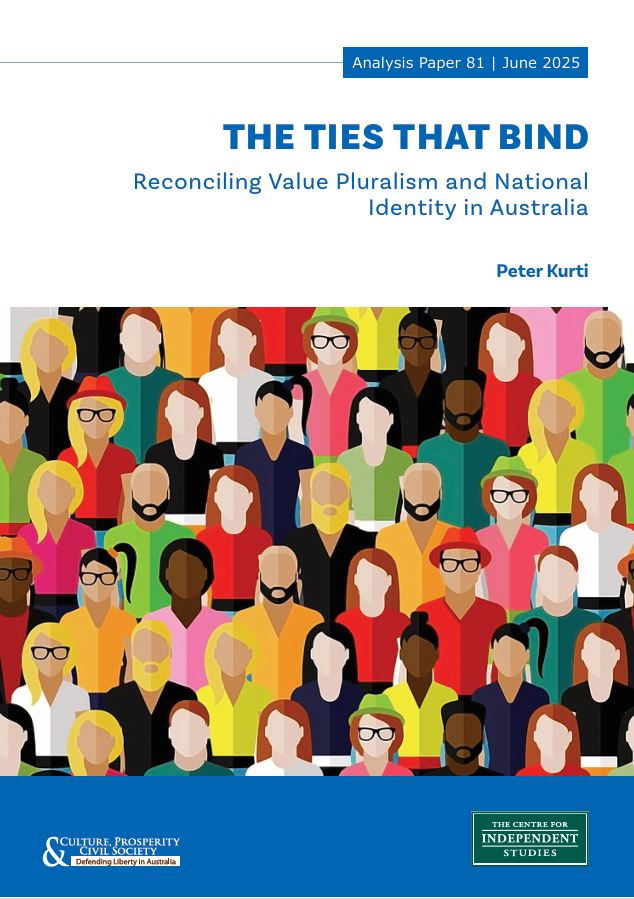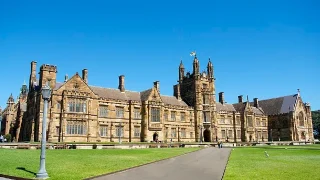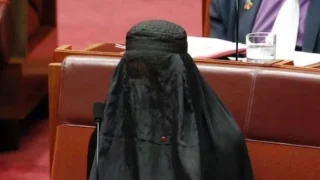
Executive summary
Australia’s multicultural democracy is under increasing pressure, not only from economic uncertainty but from the moral and cultural disagreements that have intensified in recent years. Deep cultural and moral diversity presents both remarkable opportunities and profound challenges for our national identity.
This report explores whether value pluralism — the recognition that people will continue to hold fundamentally different moral, religious, and cultural beliefs — is compatible with a cohesive national identity in a liberal democracy. It argues that Australia’s future cohesion depends not on suppressing disagreement, but on managing it fairly through civic institutions, democratic procedures and mutual restraint. This entails rethinking national identity in light of enduring moral diversity so cultural differences do not threaten social harmony.
Drawing on the political theory of value pluralism developed by Isaiah Berlin, John Gray and others, the report argues that civic nationalism — not ethnic or cultural nationalism – offers the best foundation for Australian identity. This model does not require moral consensus, but depends on shared political commitments: to the rule of law, democratic accountability, and the peaceful resolution of disagreement. It is a model that offers a robust framework for managing disagreement in a pluralist society.
The report draws a careful distinction between non-negotiable limits (such as prohibitions on female genital mutilation, child marriage, and ritual violence) and morally contested ‘grey zones’ where rights and values may conflict. These include religious exemptions to anti-discrimination laws, parental refusal of child vaccinations, and ritual slaughter.
It argues that these contested areas require structured negotiation, not moral coercion, and that pluralism must be bounded by core liberal principles, including human dignity and equal protection under the law. Addressing these challenges demands more than rule-setting; it requires a civic culture capable of managing moral disagreement with fairness and refrainment. To strengthen national cohesion in a context of deep moral diversity, the report proposes five exploratory policy directions:
- Reform civic education to equip citizens for principled disagreement and deliberation.
- Revise the citizenship test to reflect shared civic institutions rather than narrow cultural values.
- Encourage voluntary intercultural dialogue, especially in communities under pressure.
- Design conflict-resolution mechanisms that defuse moral clashes before they escalate.
- Commission longitudinal research on public attitudes and pluralism’s institutional performance.
Rather than calling for renewed consensus around fixed national values, the report calls for a civic culture capable of managing deep diversity. It argues that Australia’s identity must be grounded not in sameness, but in the institutions and norms that allow citizens to live together amid enduring difference. Only by managing difference fairly can Australia protect its democracy, strengthen social trust and build a national identity embracing a new understanding of ‘patriotism’ fit for the challenges of the 21st century.
To listen to this research on the go, subscribe on your favourite platform: Apple, Spotify, Amazon, iHeartRadio or PlayerFM.
Introduction: can pluralism and unity be reconciled?
Australia’s population is growing rapidly. Recent data released by the Australian Bureau of Statistics show that as at 30 September 2024, our residential population was estimated to be 27,309,396 — an increase of 484,000 people over the year to September 2024, representing a growth rate of 1.8 per cent. Net overseas migration (the number of overseas arrivals deducted from the number of overseas departures) stood at 379,800 people, representing approximately 78 per cent of the annual population growth.[1]
Australia is also one of the most culturally diverse democracies in the world. With more than half the population either born overseas or having at least one parent born overseas, and with more than 300 languages spoken across the country, Australia’s multicultural makeup presents a complex set of political, cultural and philosophical challenges. Among the most pressing is the question of how to sustain a coherent national identity in the context of deep moral and cultural diversity. The issue is not simply one of managing difference, but of conceptualising national belonging in ways that do not erase or marginalise diversity.
However, it should be noted that the diversity of contemporary Australia is shaped not only by immigration but also by the foundational presence of Indigenous Australians. Their historical and cultural position within the nation presents an additional and distinct dimension to the question of national identity, one that deserves careful and separate consideration. While this report focuses primarily on the challenges posed by immigration-driven multiculturalism, the enduring significance of Indigenous perspectives must not be overlooked in any comprehensive account of Australia’s national fabric.
The success of Australia’s multicultural society over the past 60 or more years has depended on a simple compact: in return for the citizen being free to maintain private cultural and religious traditions, the state expects observance of our norms and laws. The multicultural policy that oversees this compact is grounded in four key principles: the right to cultural expression, the responsibility to uphold core civic values, the promotion of social and economic participation, and protection from discrimination.
Australia’s multicultural model thus combines the recognition of cultural difference with a commitment to civic integration. Migrants are expected to respect the democratic institutions and laws of the country, but they are not required to abandon their cultural or religious identities. This dual commitment to unity and diversity reflects an implicit accommodation of a plurality of values, even if this is not articulated in philosophical terms.
However, since Hamas’s invasion of Israel on 7 October 2023, the compact on which the success of Australian multiculturalism has depended has been under unprecedented strain as the politics of the Middle East erupted on to the streets of our cities.
The tolerance and diversity of which we have been rightly proud has given way to cultural separatism and open, often violent conflict between different groups. Warnings by politicians that levels of intolerance are on the rise are coded warnings that social disintegration is upon us, something reflected in research published by the Scanlon Foundation’s Mapping Social Cohesion report:
Harmony across nationalities, cultures and religions [is] strained by conflict and tensions, particularly the violent conflict in the Middle East. Such global events infiltrate Australian society and politics through traditional and social media, and through Australia’s diversity and our ancestral, cultural and ideological connections to all sides of current debates and conflicts.[2]
Striking a balance between ‘diversity’ and a cohesive national culture which binds all citizens of a society is not easy, especially in a country such as Australia which has enjoyed sustained periods of high immigration. It requires a commitment on the part of governments, political and community leaders, teachers, families and the individual citizen to a greater whole — the idea of Australian as a nation.
Some of the challenges presented by this crisis of Australian multiculturalism have been examined in earlier reports published by the Centre for Independent Studies.[3] In particular, the question of the significance of a shared sense of national identity was examined in the 2025 report, Fractured Loyalties: Australian citizenship and the crisis of civic virtue. That report argued that as pluralism can place acknowledged demands on social cohesion, “a concept of ‘national consciousness’ of one form or another is a necessary condition of the effective functioning of a political community”.[4]
Even faced with a crisis of cultural separatism, it is highly unlikely that multiculturalism and the policies that underpin it will ever be undone in Australia. Over the past 60 or 70 years, there has been too great a commitment on the part of the governments and communities of this country to multiculturalism, and the multicultural character of our society is unlikely to change. This reality makes a revanchist yearning for an earlier era in the politics and culture of this country both pointless and ungenerous.
Yet the concept of a national identity remains important. It can express a shared sense of identity that underpins both the readiness and the willingness of citizens to cooperate with one another.[5] Yet to hope for the restoration of a single form of liberal society grounded in shared moral commitments is unrealistic in a society as socially and culturally diverse as Australia’s. Accordingly, it is important to assess the possibility for a pragmatic accommodation between the idea of the nation and rival, incommensurable values. It is with the issue of the compatibility of value pluralism with the concept of national identity in a multicultural society that this report is concerned.
It will argue that value pluralism and national identity are not inherently incompatible. However, their coexistence requires a reimagining of what national belonging means in a democracy. Rather than relying on shared values, national identity must be grounded in shared political practices and institutions that are capable of managing, rather than resolving, moral disagreement. The challenge is not to eliminate disagreement, but to manage it within a shared political framework. Only through such a civic framework can Australia uphold its multicultural commitments while preserving social cohesion in a pluralist age.
Three foundational ideas
‘Value pluralism’ asserts that human values are irreducibly diverse and often in conflict, making moral consensus difficult or even impossible. This pluralistic framework poses challenges to national identity, which typically assumes a set of shared values to sustain cohesion, legitimacy, and solidarity. One of the most pressing challenges is the question of how to sustain a coherent national identity in the context of the kind of deep moral and cultural diversity to be found in contemporary Australia. The issue is not simply one of managing difference, but of conceptualising national belonging in ways that do not erase or marginalise it.
National identity has traditionally been seen as requiring a shared set of values or a common cultural narrative. This is especially true of civic nationalism, which, unlike ethnic nationalism, does not rely on ancestry or cultural homogeneity but still assumes a baseline agreement on liberal-democratic principles such as individual freedom, gender equality, and secularism. Yet in a society marked by genuine moral pluralism, even these principles may be contested. This creates a paradox: how can a pluralist society demand adherence to shared values without undermining its own commitment to diversity?
Australia provides a rich empirical context in which to explore this question. While the country’s multicultural framework has been relatively successful, it remains anchored in liberal-democratic norms that sometimes conflict with the moral outlooks of various cultural or religious communities. Controversies over religious dress, faith-based education, same-sex marriage and gender roles have all helped to illustrate the limits of toleration and the challenges of achieving genuine pluralism.
1. Value Pluralism: questioning universalism
One of the most significant thinkers to have explored the idea of value pluralism is the English political philosopher, John Gray, who began his intellectual life as a liberal. For Gray, liberalism is to be understood as a family of doctrines defined by a commitment to individual liberty and toleration. Many liberal thinkers appeal to a universal moral doctrine — moral monism — that posits a single best way to live and espouses one conception of the good life deemed applicable to all human individuals in all societies.
For Gray, this universalistic assumption is wrong because it actually rests on parochial and ethnocentric assumptions and enshrines particular moral ideals. For Gray, liberalism is not neutral as to competing conceptions of the good life, but is founded upon a specific moral vision. Thus, Gray challenges the notion that a single, universal set of moral principles can guide all societies. It must surrender its claim to moral validity:
Once liberal culture is seen to be only one of the cultural forms present even in predominantly liberal states, the political problem alters, and becomes that of finding a modus vivendi for diverse cultural forms, liberal and non-liberal.[6]
Rather than view liberalism as a universal moral doctrine, Gray proposes it must be understood as a modus vivendi which recognises that a liberal society is not a community of shared values; rather it is to be understood as a framework for peaceful coexistence.[7] Modus vivendi is thus to be understood as a practical arrangement that allows different value systems to coexist within a single political framework. The goal is not to secure agreement on ultimate values, but to create stable institutions that can manage persistent moral disagreement.
The analysis offered here builds primarily upon the value pluralist tradition articulated by thinkers such as Gray and Isaiah Berlin. However, it is important to note that other accounts of multiculturalism, such as those advanced by Will Kymlicka and Bhikhu Parekh, have also provided influential frameworks for thinking about the accommodation of diversity within liberal democracies. Kymlicka’s theory of multicultural citizenship, in particular, seeks to reconcile group-differentiated rights with liberal individualism, while Parekh has argued for the reconstitution of national identities to recognise the plurality of ways of life within them.[8]
Gray conceives liberalism as a contingent, historically situated practice for managing pluralism. Its future lies in accommodation rather than consensus.[9] Value pluralism recognises that human values are numerous, often conflicting, and ultimately incommensurable. It asserts that while many values may be equally valid, they often cannot be reconciled or ranked in any objective way. These conflicts are not the result of ignorance or error, but are intrinsic to the human condition. Where Miller calls for convergence, Gray’s modus vivendi provides the more realistic foundation for contemporary civic cohesion.
This conception of value pluralism has direct implications for political theory. It challenges the liberal-democratic state to tolerate value systems that may not share its foundational commitments, as long as those systems are willing to coexist peacefully within a shared legal and political order.
The pursuit of modus vivendi is not a quest for some kind of super-value. It is a commitment to common institutions in which the claims of rival values can be reconciled. The end of modus vivendi is not any supreme good — even peace. It is reconciling conflicting goods [and] can be pursued by ways of life having opposed views of the good.[10]
It also demands a more modest conception of the state—one that does not claim moral supremacy but instead prioritises the peaceful negotiation of difference. Modus vivendi is not a moral ideal, but a political project. Politics, is not about consensus, but coexistence. In what Gray calls “the postmodern age”, the pluralist challenge to liberal states and cultures is to renounce “any claim to universal authority, and learn to live in harmony with other, non-liberal cultures and polities”.[11] This is the basis of toleration, as noted by Berlin whose work profoundly influenced Gray:
Toleration is historically the product of the realisation of the irreconcilability of equally dogmatic faiths, and the practical improbability of complete victory of one over the others. Those who wished to survive realised that they had to tolerate error.[12]
If value pluralism entails the rejection of any rational consensus on values, but instead advocates a politics of compromise, accommodation and coexistence, and recognises the inevitability of conflict between competing values, is it reconcilable with the foundational assumptions that underpin conventional ideas of nationalism and national identity?
2. Nationalism and national identity: the ties that bind?
National identity refers to the shared sense of belonging to a national community. This identity is typically constructed through narratives of common history, language, culture and values which are the modes of life through which attachments and allegiances are expressed.
In a sense, national identity comprises what people already believe about the nation to which they belong. As such, the political philosopher, David Miller, has argued that national identity is to be understood as a legitimate part of personal identity. From this follows the idea that the nation describes the contours of an ethical community, and that ethics should give weight to national boundaries: “the duties we owe to our fellow-nationals are different from, and more extensive than, the duties we owe to human beings as such”.[13]
Miller offers an account of national identity that is complex and multi-dimensional, focusing on common beliefs, historical continuity, territorial attachment and cultural distinctiveness. He argues that national identity is malleable and potentially inclusive, and that multicultural societies can sustain a common overarching identity while preserving diversity. His argument is that nations in practice extend membership freely to those willing to exhibit the traits that make up the national character. “Nationality, precisely because it aims to be an inclusive identity, can incorporate sub-groups in this way without demanding that they forsake everything they already hold dear” [italics original].[14] Indeed, and citing the British Muslim writer, Tariq Modood, Miller argues that minorities may benefit from strong national symbols that affirm their inclusion.
Even so, Miller’s account of nationality has been criticised for threatening to marginalise minorities and suppress pluralism. While he argues for the thinness and flexibility of national identity, he has been criticised for not fully addressing how power imbalances shape which cultural symbols dominate. Miller’s optimism about the capacity of minorities to adopt national traits has also been criticised for underplaying the psychological cost and political resistance many minorities face in being required to assimilate. Indeed, the philosopher, Brian Barry, has argued that Miller’s claim that national identity can be inclusive and flexible is a form of disguised assimilationism that puts undue burdens on minorities.[15]
Barry’s insistence upon a liberal universalist approach to the question of multiculturalism and nationality has intellectual appeal. However, Miller’s defence of ethical particularism rooted in national identity and shared sentiments — what he describes, citing David Hume, as “a share of this gross earthy mixture”[16] — is attractive for its applicability to the reality (and challenges) of life in a culturally diverse society. Miller uses the analogy of the family — where feelings mark the group boundary but duties do not derive directly from sentiment — to argue that moral obligations are rooted in a shared national culture and shared political institutions.[17] This idea of a shared national culture lies at the heart of the concept of nationalism which has been one of the most powerful and contested ideas in 20th and 21st century history.
Nationalism presents both opportunities and challenges, for while it can foster exclusion, it can also promote social solidarity and civic engagement. Berlin offered this account of nationalism as a complex of factors which shape human society:
By nationalism, I mean the conviction that men [sic] belong to a particular human group, and that the way of life of the group differs from that of others; that the characters of the individuals who compose the group are shaped by, and cannot be understood apart from, those of the group, defined in terms of common territory, customs, laws, beliefs [and] social institutions; and that it is these factors which shape human beings, their purposes and their values.[18]
Nationalism, therefore, can be understood as the political ideology that seeks to preserve and promote this idea of a shared identity, often through the sovereign state. It can take a number of forms and the literature on nationalism is vast. Modernists, such as Ernest Gellner and Benedict Anderson, have argued that nationalism is a product of modernisation, particularly industrialisation, state-building and mass literacy.[19]
The two most relevant forms of nationalism for the purposes of the present report are ethnic nationalism and civic nationalism, a distinction first made by Hans Kohn.[20] According to Kohn, ethnic nationalism is to be understood as having membership in the nation based on ancestry, shared culture, language, or religion. It tends to be characterised by authoritarian regimes. Kohn points to examples in 19th century Eastern Europe and Asia. Ethnic nationalism tends to be exclusionary and resistant to cultural diversity.
Civic nationalism, by contrast, is rooted in the Western Enlightenment and liberal political theory. It defines national identity in terms of political participation, shared institutions and political values, legal equality, individual rights and a commitment to democratic principles. As Kohn argues, it has a voluntarist character based on choice rather than birthright: “the civic nation of the West is open to newcomers; its cohesion rests not on heredity but on consent”.[21] Civic nationalism offers no final resolution to moral disagreement; rather, it provides a framework for managing intractable differences within a shared political order. As it appeals to shared political values grounded in shared institutions, civic nationalism is often held up as more inclusive and better suited to multicultural societies.
However, even civic nationalism can be problematic from the standpoint of value pluralism. It typically presupposes a shared set of core (in Kohn’s case, specifically Western) values —such as individual autonomy, gender equality and secularism — which may not be universally accepted in a diverse society. While civic nationalism allows for cultural variation, it often draws a boundary around what kinds of values are acceptable within the national community. This boundary can become a source of conflict, especially when minority communities feel pressured to conform to dominant norms.
While Kohn’s analysis remains important for the examination of nationalism, his distinction has been criticised by scholars such as Rogers Brubaker for oversimplifying the complex issue of national identity and for legitimising political practices that are effectively exclusionary of certain segments of the population.[22] Brubaker argues that no nationalism is purely civic or purely ethnic. He also criticises Kohn for creating a moralistic division between East and West which stigmatises the former and idealises the latter:
The contrast between a Western civic and an Eastern ethnic nationalism is overdrawn, and it tends to obscure more than it reveals. In practice, both civic and ethnic conceptions of nationhood are found — though in varying proportions — in both Western and Eastern nationalisms.[23]
Brubaker’s warning that the civic-ethnic distinction is often overdrawn in practice needs to be taken seriously. His argument that civic nationalisms may also contain exclusionary elements highlights the complex and overlapping character of national identities.[24] This report acknowledges the limitations of Kohn’s typology, but it retains its basic value for examining the broad tensions between conceptions of national belonging rooted in ancestry and those grounded in political commitment. Kohn’s distinction, even if imperfect, remains analytically useful for assessing the pressures multicultural democracies face today.
Critics have also argued that liberal conceptions of nationalism must reconcile cultural identity, which may be expressed through ethnic nationalism, with democratic inclusion, which may be expressed most appropriately by the political forms associated with civic nationalism.
The issue of nationalism is highly complex. Even so, the concept of national identity serves important political functions. It can help to generate social cohesion, encourage civic engagement and legitimise political institutions. But it can also exclude and marginalise. In pluralist societies, the construction of national identity must navigate between the need for unity and the imperative to respect difference. Is it possible to develop a conception of national identity that can accommodate the value pluralism entailed by multiculturalism without dissolving into relativism or incoherence?
3. Multiculturalism: a question of compatibility
Multiculturalism in Australia is both a sociological fact and a political response to cultural diversity. The political response represents attempts to accommodate the fact of cultural diversity arising from an end to the ‘White Australia’ policy and the country’s post-World War ll immigration policy.[25] Multiculturalism has, for the most part, been successful and has enjoyed the sustained support of the Australian population.[26]
The policies to which this has given rise over several decades have sought to promote inclusion while recognising cultural difference and have evolved from early policies of assimilation to a more formal recognition of cultural diversity. The official policy of multiculturalism includes commitments to social cohesion, economic participation, and mutual respect. It is supported by a range of institutional and legal mechanisms, such as the Racial Discrimination Act 1975 (Cth), and a variety of programs designed to support migrant communities.[27]
However, multiculturalism usually operates within a framework of liberal-democratic norms. For example, the ideal of Australian multiculturalism recognises cultural differences, but expects these to be expressed in ways that are compatible with prevailing liberal norms of the nation. In practice, this means that certain cultural practices — particularly those related to gender, religion, or authority — may be tolerated only to the extent that they do not conflict with dominant norms. When conflict does arise, this can create a tension between the policy-based recognition of diversity and the maintenance of social cohesion.[28]
Value pluralism deepens this tension. While multiculturalism seeks a balance between diversity and unity, value pluralism insists that some conflicts cannot be resolved through compromise. It challenges the assumption that cultural groups will naturally converge on shared liberal values, and demands a political framework capable of managing intractable disagreement. This has significant implications for national identity, as it suggests that unity must be built not on shared values but on shared procedures and institutions that can mediate moral conflict. In other words, national identity appears to presuppose some degree of moral consensus.
Challenges to compatibility: the limits of difference
This report has argued that there are several deep tensions between value pluralism and the traditional concept of national identity. As discussed above, whether in its ethnic or civic form, nationalism often seeks to define the character of a people through shared beliefs, values, and norms. This unifying narrative provides a basis for solidarity and motivates individuals to contribute to the common good. However, it also imposes boundaries on what kinds of difference can be accommodated.
Value pluralism challenges this logic in three significant ways. First, if human values are incommensurable and often irreconcilable, then any attempt to define a shared moral foundation for national identity may be inherently exclusionary. This is because the requirement to adhere to certain ‘national values’ may effectively marginalise communities whose ethical frameworks diverge from the dominant model. This can create a politics of resentment and alienation, especially among groups that feel perpetually asked to justify their place within the nation.
A second challenge concerns the role of the state in managing moral conflict. In a pluralist society, the state must inevitably make decisions that privilege some values over others. This is true in areas such as education, religious freedom, freedom of speech and association, gender rights and the role of women in society. However, clearly the state runs the risk of violating the very pluralism it claims to uphold when it imposes liberal norms in the name of national identity.
The third challenge arises from the difficulty of sustaining the emotional resonance of national identity in a pluralist society. National symbols, ceremonies, commemorations and narratives often rely on a shared emotional register that presupposes common values and experiences. In a society marked by deep diversity, these narratives may feel hollow or exclusionary to many citizens. The symbolic and affective dimensions of national belonging thus become contested terrain.
While these challenges are significant, national identity can be made compatible with value pluralism when reimagined in civic terms. A civic national identity rooted in democratic participation, legal equality and mutual respect can accommodate a wide range of moral outlooks. It is also important to recognise that the challenges of sustaining a coherent national identity in a pluralist society are compounded by forces of globalisation and the rise of digital communications. Exposure to global value systems, transnational identities and social media environments driven by ever more sophisticated algorithms can accelerate the fragmentation of national narratives, intensify identity-based solidarities and further complicate efforts to foster a common civic imagination.
Unlike ethnic nationalism, which is based on language, heritage and even shared descent, civic nationalism emphasises shared political values, equality before the law and a commitment to the rights of the individual. These are grounded in liberal values — above all, the dignity of the person — which form the ethical foundation of Australia’s civic institutions. These values do not require comprehensive moral agreement but do demand allegiance to the rule of law and democratic principles. Citizens are not required to agree on ultimate values, only to commit to a shared political process for managing their differences. As Kohn observes: “The nation, according to the Western conception, is a fusion of individuals of different origins into a community with a common destiny and equal rights”.[29]
Such an identity is not, of course, without its tensions. It may lack the emotional power of more ethnic conceptions of nationalism which emphasise a common language and a common heritage; and it may well demand a high level of political maturity and institutional robustness, especially when faced with widening cultural and social differences. But it does offer a viable foundation for unity in the face of the kind of diversity to be found in contemporary Australia. By focusing on shared institutions rather than shared values, civic nationalism can provide the cohesion necessary for democratic governance without demanding moral or ethno-cultural conformity.
In the context of contested debates about globalisation, extensive migration and the rise of populist politics, Kohn’s distinction between civic and ethnic nationalism — significant though it has been for discussion about nationalism — can seem overly simple. It must also be acknowledged, once again, that his concept of ‘nation’ is heavily derived from Western conceptions of nationalism, nation and the nation state as they arise from within, and against the background of, the Enlightenment.
Even so, the case for civic nationalism remains strong given the pluralism of values that characterises multicultural Australia because it has the capacity to unite people based on a shared political commitment. Indeed, given this pluralism of values, Gray’s argument for a modus vivendi becomes more compelling because it offers the prospect of a political settlement that enables peaceful coexistence among groups with irreconcilable differences:
The case for modus vivendi is not that it is some kind of transcendent value which all ways of life are bound to honour. It is that all or nearly all ways of life have interests that make peaceful coexistence worth pursuing. Peaceful coexistence is worth pursuing only insofar as it advances human interests.[30]
In the modus vivendi model of civic nationalism, national identity is less about who we are and more about how we live together. It is a procedural identity, defined not by common values but by common rules, rights, and responsibilities.
Although it is a set of beliefs about the nation that is frequently challenged for being chauvinistic, the idea of patriotism can also play a constructive role in this context because it need not be opposed to value pluralism. When grounded in civic principles, such as the principle of service to others, rather than in myths of ethnic or cultural supremacy, patriotism can support the kind of inclusive, national identity required in a multicultural society. In doing so, patriotism can help foster social cohesion and democratic responsibility without demanding moral uniformity:
Patriotism, properly understood, is not a boast. It is not a denial of past wrongs or a refusal to acknowledge suffering. It is not about claiming that our country is the best. Rather, it is a steady and reasoned love — a recognition of shared history, values and aspirations. It is the emotional glue that binds a nation together. [31]
Moreover, a civic framework that enables patriotism to perform such a function also has the potential to strengthen democratic life. It can encourage citizens to engage with difference rather than retreat into enclaves; it can promote humility, empathy and the capacity to live with disagreement. In doing so, it can transform national identity from a tool of exclusion into a practice of inclusive coexistence. This is the promise of a pluralist nationalism: a nation not united by sameness, but by a shared commitment to managing difference in a democratic way.
However, it is important to emphasise that this framework draws a clear distinction between cultural practices that can be accommodated and those that violate non-negotiable moral and legal principles.
While some limits on pluralism are clear and non-negotiable — such as the prohibition of female genital mutilation, child marriage or violent ritual practices — others fall into a more contested ‘grey zone’, where competing rights and interests must be carefully balanced. These cases highlight the practical challenges of negotiating pluralism within a civic framework and demonstrate that sustaining national cohesion requires ongoing negotiation, not simple rule-setting.
For example, religious schools may seek exemptions from anti-discrimination laws in order to uphold particular moral teachings, raising difficult questions about the balance between religious freedom and equality rights.[32] Similarly, parental refusal to vaccinate children on religious or philosophical grounds tests the limits of individual conscience when weighed against public health imperatives.[33]Even the practice of ritual slaughter without stunning, as permitted under some halal and kosher dietary laws, provokes debate over the scope of religious accommodation in light of animal welfare standards.[34] Even hypothetical or rare cases illustrate the principled limits of accommodation in a civic framework.
Although extremely rare, the hypothetical reappearance of harmful practices such as sati (widow-burning), even among small diaspora communities, are examples of behaviours that would be categorically rejected under Australian law. Such practices fundamentally conflict with the principles of human dignity and equality embedded in Australia’s democratic order.[35] This underscores the critical point that the accommodation of pluralism is not limitless; it is bounded by a shared legal framework that secures individual rights
These examples do not admit of easy solutions. But they illustrate that civic pluralism operates not in a moral vacuum, but within a framework of negotiation, compromise and ongoing public debate. Managing these tensions requires robust democratic institutions, a commitment to the rule of law and the cultivation of habits of respectful disagreement. Importantly, they are a reminder that the challenge for pluralism is not merely to draw hard legal lines, but to foster a civic culture capable of managing difference with fairness and restraint.
Rethinking social cohesion in multicultural Australia
1. Challenges to multicultural pluralism
Australia’s experience of multiculturalism has been, for the most part, highly successful. Over the decades since the formal ending of the ‘White Australia’ policy in 1973, the country has transitioned from a policy of assimilation to one that formally recognises and promotes cultural diversity. Indeed, successive federal governments have affirmed that cultural diversity is to be considered a fundamental characteristic of Australian society and a source of national strength.
This policy is grounded in the four key principles mentioned earlier: the right to cultural expression, the responsibility to uphold core civic values, the promotion of social and economic participation, and the protection from discrimination. The Multicultural Access and Equity Policy ensures that government services are responsive to the needs of culturally and linguistically diverse communities. At the state and local levels, multicultural councils, advisory boards and community grants foster grassroots engagement.[36]
Nevertheless, as outlined at the beginning of this report, tensions persist and, indeed, have mounted since October 2023. Even before then, however, controversies over the integration of Muslim communities, debates about religious freedom and same-sex marriage, and the polarised political debates about borders, refugees and immigration in general have exposed some of the limits of tolerance and provoked anxiety about national cohesion. These narratives, especially in the media, tend to be more prominent during periods of perceived crisis, such as after a terrorist attack or during economic downturns with accompanying cost-of-living pressures.[37]
Recent findings from the Scanlon Foundation’s 2024 Social Cohesion study indicate that while certain events, such as the Israel/Gaza conflict, have exposed fractures along moral and ideological lines, economic insecurity also remains a key driver of tension:
Australians’ sense of belonging and social justice are significantly below their long-term averages, while economic and cost of living pressures contribute to stubbornly high financial dissatisfaction and stress. Acceptance of Australia’s diversity and multicultural harmony is also strained by the experience of discrimination and mistreatment.[38]
Thus, economic tensions are evident through cost of living pressures and financial dissatisfaction. Moral tensions are reflected in reduced feelings of social justice, increased discrimination and challenges to multicultural harmony. These tensions do not replace material concerns but highlight the limits of existing frameworks for managing pluralism. They can also lead to calls for the reaffirmation of ‘Australian values’ with renewed emphasis on revising the Australian Citizenship Test. (The case for revising the Citizenship Test will be examined below in the section proposing policy suggestions.
But does a commitment to value pluralism and pursuit of a modus vivendi permit promotion of what is, admittedly, a narrowly (and rather vaguely) defined set of cultural norms emphasising mateship, egalitarianism, and freedom of speech? In a culturally diverse society, how reasonable is it to assume that these values will resonate with all communities, converting civic nationalism into a covert form of cultural assimilation?
2. Facing the challenge: taking pluralism seriously
There are already many examples of pluralism operating effectively within Australian institutions. Local councils fund interfaith forums, community festivals and cultural education programs that foster intercultural understanding. Religious schools, while regulated by the state, are for the most part allowed significant autonomy in teaching their values although some Christian schools have been widely criticised when adhering to faith-based principles concerning human sexuality and gender. In the legal system, courts occasionally take cultural context into account when sentencing or resolving family disputes.
However, when conflicts of value do arise — such as in disputes over gender roles, religious attire or limits to freedom of speech — the resolution often favours secular liberal norms. For proponents of multiculturalism, this tends to reinforce the view that the state’s commitment to pluralism remains conditional and that pluralism is tolerated only within a framework defined by dominant values. From a legal and political standpoint, the enforcement of liberal norms surely makes sense, as the present author has argued previously.[39] But again, for multiculturalism’s advocates, this strategy can serve only to entrench feelings of marginalisation and reduce the legitimacy of national identity among minority groups. It is, therefore, important to distinguish between types of disagreement: public crises driven by international conflict (such as the Israel/Gaza war) may call for legal enforcement and moral clarity, whereas enduring moral disagreements (such as on gender, religion, or parenting) call for negotiation, civic education, and institution-building. In its responses, a pluralist framework must always remain sensitive to context.
If Australian governments remain serious about maintaining and building social cohesion, the next phase of policy making needs to accept that the assumption that liberal values will be universally interpreted or prioritised in the same way is no longer viable, at least in this country’s multicultural society. As Gray has argued, since his decisive turn to embrace Value Pluralism some 30 years ago, values such as liberty, equality, justice and community are not only occasionally in tension, but fundamentally irreconcilable. There is no higher ‘meta-principle’ that will allow us to adjudicate definitively between them. Any attempt to impose a universal framework will ultimately involve coercion and exclusion thereby undermining liberalism’s own normative commitments. What is needed is a framework that protects those values even amidst deep disagreement about their meaning of application.
Pretending that there are no value conflicts to be addressed in society serves only to perpetuate the illusion of liberal universalism; that a universal political morality is applicable in a world of plural and conflicting values. This, in turn, can only generate further tension as incommensurable values continue to clash. A realistic assessment of the pluralism characterising Australian society must entail a deeper commitment to a modus vivendi as a realistic way of accommodating conflicting ways of life without appealing to universal social and cultural norms. But how is this to be accomplished?
Perhaps the first step is to make explicit the terms under which value conflict is managed. Rather than pretending value conflicts do not exist, or persisting in attempting to resolve them through uniform standards, Australia must accept the need to develop transparent processes for negotiation, compromise and mutual accommodation. This requires not only institutional reform but is also bound to require a shift in public discourse from one that demands conformity to one that accepts and manages disagreement.
Pluralism in practice: five proposals for discussion
The key implication that arises from the analysis in this report is that Australia’s national identity must evolve to reflect the value pluralism that characterises our society if we are to address the conflicts and tensions arising from multiculturalism. It must be emphasised that the policy proposals in this report are offered not as definitive solutions, but as prompts for further exploration. They reflect the logic of value pluralism and its potential to strengthen Australia’s civic cohesion in a context of moral diversity. The following five proposals offer practical steps for strengthening social cohesion.
It is no longer feasible — if it ever was — to insist upon a narrow set of cultural norms and civic moral values; rather, national identity must be understood in terms of the conception of a civic nationalism which is grounded in civic principles: adherence to democratic procedures, respect for legal rights and participation in shared institutions. It is a model of national identity that emphasises how citizens relate to one in political rather than moral terms.
Such a reorientation requires not only policy changes but a transformation in public imagination. Political leaders, educators and media outlets all play a significant role in shaping the national narrative of who belongs and on what terms. By presenting national identity as a civic practice rather than a moral consensus, Australia can build a more inclusive and resilient democracy.
The practical challenge, then, is how to institutionalise these civic principles in ways that promote peaceful coexistence across deep moral differences. The following policy recommendations are designed to translate these theoretical commitments into concrete measures capable of sustaining a cohesive and resilient national identity. However, they are not technical fixes alone. They are aimed at realising a civic national identity that reflects the value pluralism at the heart of Australian democracy. Together, they offer a roadmap for moving from philosophical commitments to institutional reforms that can secure social cohesion in practice.
Policy recommendations towards a civic national identity
In order to cultivate a civic national identity more compatible with value pluralism than liberal universalism, it will be necessary to implement a series of targeted reforms across several domains of public life. These reforms should aim to strengthen democratic participation, institutional responsiveness and public understanding of the legitimacy of moral difference in public life while preserving (and observing) the structures of Australian governance and civil society.
a) Civic education reform
Robust civic education is essential for preparing citizens to navigate moral disagreement, a core requirement of any pluralist society. Education reform will develop and implement a national civics and citizenship curriculum that identifies value pluralism (although not necessarily using that term) as a core theme. The curriculum should encourage students to examine case studies involving moral disagreement such as might arise in debates about freedom of speech as against protection from hate speech, or religious freedom as against secular norms about gender and human sexuality. At the same time, care must be taken to ensure that new content strives for cultural consensus rather than provoking inter-cultural conflict.
Curriculum reform will help develop skills in democratic deliberation, active listening and respectful disagreement. Teacher training programs should also include modules on facilitating discussion across lines of value conflict, and assessment frameworks should reward analytical reasoning over conformity to particular views.[40]
b) Citizenship test revision
The full scope of the current Australian Citizenship Test is set out in the booklet Australian Citizenship: our common bond published by the federal government.[41] The test is intended to promote a civic understanding of national identity and democratic values such as the rule of law, freedom of speech and gender equality. Those sitting the test face 20 multiple-choice questions and five mandatory questions on Australian values, such as freedom, respect, fairness and equality of opportunity (all of which must be answered correctly). The overall pass mark is 75 per cent. The test performs an important role in defining civic belonging. However, in order to promote a stronger understanding of civic national identity, the test, which focuses narrowly on what is vaguely referred to as ‘Australian values’, should be expanded to assess an aspiring citizen’s more detailed understanding of the Constitution, the rule of law, voting rights and the mechanisms of democratic accountability.
Given a commitment to value pluralism, the test should also include interpretative exercises involved scenarios about moral conflict (such as a workplace requests for religious accommodation) that ask an applicant how such issues might be addressed within Australia’s legal and institutional framework. By way of comparison, citizenship tests in Canada and the United Kingdom have a broader scope: Canada tests specifically on multiculturalism and the UK tests on more detailed critical civic knowledge about history and the functioning of legal and political institutions.
c) Intercultural dialogue initiatives
There are already many established community-based organisation that facilitate intercultural and interfaith dialogue. However, these programs often focus on celebratory multiculturalism with an emphasis on food and festivals (for example, ‘Harmony Week’, an initiative launched by the Howard government in 1999 to coincide with the United Nations International Day for the Elimination of Racial Discrimination).[42] Greater emphasis could be given, either through local government organisations or those based in the community, to structured conversations about differences in values, norms and cultures in order to promote discussion about shared challenges and training in the resolution of difference.
d) Conflict resolution mechanisms
Establishing effective conflict resolution mechanisms gives practical form to the modus vivendi approach central to the argument of this report. Mediation of values conflicts could become the responsibility of tribunals or ombudsman offices staffed by trained mediators and those skilled in cross-cultural negotiation and moral reasoning. However, their role would not be to impose a resolution backed up by legal sanction, but to facilitate understanding and compromise. In addition, such a mechanism must be carefully designed to avoid becoming grievance-driven or adversarial. Its purpose is not to adjudicate culture, but to defuse tension early through structured, good-faith engagement. The model must avoid the bureaucratic pitfalls of past interventions, such as grievance inflation or institutional overreach. The legal system provides essential boundaries that ensure pluralism operates within a framework of fundamental rights.
Thus, Australian law prohibits child marriage, setting a clear minimum age of marriage and rejecting cultural or religious defences for underage unions.[43] This prohibition is not a rejection of cultural pluralism, but an affirmation that certain baseline standards of autonomy, consent, and protection must be preserved in a liberal democracy. Other areas of focus could include disputes in family law, education (such as curriculum content in faith-based schools), religious attire in public institutions and freedom of speech. The danger inherent in creating new tribunals charged with resolving conflict is that these bodies then have an interest in highlighting differences and conflict, thereby exacerbating the problems they are intended to solve.[44]
e) Research and evaluation
It will be important to encourage research on value pluralism and civic national identity with a particular focus on public attitudes, institutional effectiveness, and the lived experiences of cultural minorities. Notable in this area of research is the annual Scanlon Foundation’s Mapping Social Cohesion report which surveys a range of topics such as social attitudes, social cohesion and the impact of economic factors on well-being. The Department of Home Affairs, which has responsibility for multiculturalism and the administration of matters pertaining to Australian citizenship, in collaboration with universities and independent think tanks, such as the Centre for Independent Studies, should commission regular reports assessing the success of civic integration strategies and the effectiveness of pluralism initiatives. The output from this research should inform future policy development and encourage the promotion of civic pluralism as a national idea.
Comparative research into how other multicultural democracies have managed the challenges of civic integration would offer valuable insights for Australia. For example, Canada’s official Multiculturalism Act[45] and Switzerland’s federal accommodation of linguistic and religious diversity provide alternative models of managing deep pluralism. Systematic study of such experiences could inform the development of more nuanced civic integration strategies tailored to Australian conditions.
These five recommendations also draw selectively on David Miller’s defence of nationality. Miller’s argument that national identity fosters solidarity, shared obligation and democratic participation provides partial support for a civic conception of nationalism that prioritises public culture over ethnic homogeneity.[46] His emphasis on the importance of national myths in sustaining democratic trust affirms the value of a shared narrative, albeit one open to reinterpretation and contestation.
However, Miller’s account does assume a relatively cohesive national culture into which minorities can integrate, and thus possibly underestimates the extent to which there is already a plurality of value in a multicultural democracy such as Australia. Where Miller proposes moral convergence, this report supports Gray’s commitment to value pluralism which entails institutional pluralism and negotiated coexistence. Miller’s framework is therefore a useful but limited resource for reconciling value pluralism with national identity in deeply diverse societies.
The recommendations put forward in this report aim to foster a pluralist public culture where diversity of moral and cultural values is recognised not only as a demographic fact but as a source of democratic vitality. They also seek to move Australia from a model of conditional inclusion — where difference is tolerated within tight limits — to one of negotiated coexistence. Political leaders and media institutions have a vital role to play in shaping these narratives of belonging and in fostering a civic imagination capable of accommodating disagreement. These strategies all help to ensure that pluralism is embraced as a core feature of national identity, recognition is given to the strength of disagreement as a democratic resource and the legitimacy of difference in public life is accepted.
Conclusion: managing difference, sustaining unity
Australia’s success as a multicultural democracy depends not just on celebrating diversity but on learning how to live with deep disagreement. As cultural and moral pluralism become enduring features of Australian life, the challenge is not merely to tolerate difference, but to build the civic habits and institutional frameworks that allow us to negotiate disagreement fairly, peacefully, and under the rule of law.
This report has argued that Australia’s national identity must be grounded in civic, not cultural, nationalism — an identity based on shared political commitments, democratic accountability, and legal equality, rather than a narrow set of cultural values. Such an identity does not require that all Australians think or live alike, but it does require a shared commitment to constitutional principles that protect fundamental rights and uphold the dignity of all.
Importantly, civic nationalism cannot rely on institutions alone. It also needs the symbolic and emotional resources that generate belonging and loyalty — public rituals, shared civic stories, and a patriotism grounded in democratic ideals. Australia’s existing multicultural framework already contains many of these elements: from Anzac commemorations to citizenship ceremonies, from civic volunteering to public service. But as this report shows, those resources must be deliberately cultivated and adapted to a pluralist age.
Some limits on pluralism are clear and non-negotiable: practices such as female genital mutilation, child marriage and violent ritual practices are fundamentally incompatible with Australia’s legal and moral framework. Other cases — religious exemptions from anti-discrimination law, vaccination refusal, and ritual slaughter — fall into contested ‘grey zones’ that demand careful negotiation, public deliberation, and, at times, principled compromise. These examples remind us that pluralism is not a recipe for relativism, nor a surrender of liberal-democratic commitments, but a practical framework for managing disagreement within limits.
Some may ask whether value pluralism truly offers anything new. After all, Australia already accommodates difference within its liberal legal and democratic frameworks. However, what value pluralism contributes is not an alternative political philosophy, but a clearer understanding of how our existing institutions function. It dispenses with the fiction of full moral consensus and acknowledges that many accommodations, such as religious exemptions, ritual practices, or contested speech, are not settled by shared moral values; rather, they are managed through negotiation, legal compromise and institutional restraint. Value pluralism clarifies the limits of civic accommodation without demanding cultural conformity; and it provides a more honest, more realistic account of how diverse societies endure. Far from replacing liberal civic nationalism, value pluralism makes its practice more credible by grounding it in the management of disagreement, rather than the presumption of agreement.
These tensions cannot be permanently resolved. They must be continuously managed through robust institutions, public trust and a civic culture capable of accommodating difference without slipping into disorder. This report’s recommendations on civic education, an inclusive citizenship policy, intercultural dialogue, conflict resolution mechanisms and ongoing research, all aim to help Australia develop a civic identity strong enough to hold its diverse population together. These measures are designed not to impose consensus, but to foster the habits of coexistence and the civic virtues required for a pluralist democracy to flourish. Political leaders and media institutions also play a critical role in shaping the civic imagination required to sustain a pluralist democracy and to articulate a vision of national belonging that is inclusive, resilient, and grounded in democratic values. Without a shared civic framework, moral disagreements risk hardening into social divisions that erode trust and fuel political extremism.
The task of reconciling value pluralism with national identity is ongoing and must be responsive to emerging challenges. The coming years will test Australia’s capacity for civic cohesion in new and unpredictable ways. The proliferation of digital misinformation and social media echo chambers threatens to undermine trust and deepen divisions. Global conflicts and shifting geopolitical alliances may reverberate domestically, intensifying identity-based solidarities and grievances. Persistent economic inequalities risk fuelling resentment and undermining the legitimacy of civic institutions. The ongoing process of reconciliation with Indigenous Australians will also continue to shape debates about belonging, justice, and the national narrative.
These challenges underscore the need for a resilient civic culture that is capable not only of managing disagreement, but also of adapting to changing circumstances with fairness and restraint. The future of Australia’s national identity will depend on the willingness of governments, institutions, and citizens alike to invest in the civic foundations that enable pluralism to be a source of strength rather than division.
Australia’s success as a pluralist democracy has never rested on the elimination of difference, but on the capacity to manage it within a shared political order. Unity does not mean uniformity. It means a shared commitment to sustaining a common life in which disagreements are handled with fairness, respect and restraint. That is the Australia we must build — a society strong enough to embrace pluralism, confident enough to hold together across its many differences, and wise enough to see that its greatest strength lies in its ability to accommodate, rather than erase, moral and cultural diversity.
References
The author would like to thank The Rt Hon Lord Biggar of Castle Douglas CBE, the Hon David Kemp AC and Simon Cowan for their critical comments and feedback in the course of writing this report. All errors that remain are, of course, his own.
[1] Australian Bureau of Statistics (September 2024), National, state and territory population, ABS Website, accessed 19 April 2025.
[2] James O’Donnell et al., Mapping Social Cohesion 2024, (Scanlon Foundation Research Institute: Melbourne, Vic., 2024), 7.
[3] See, Peter Kurti et al., The Future of Australian Multiculturalism, (Centre for Independent Studies: Sydney NSW, 2024) and, Peter Kurti, Fractured Loyalties: Australian citizenship and the crisis of civic virtue, (Centre for Independent Studies: Sydney NSW, 2025).
[4] Peter Kurti, Fractured Loyalties, as above, 9.
[5] Peter Kurti, Fractured Loyalties, as above, 8.
[6] John Gray, Liberalism (2nd edition), (University of Minnesota Press: Minneapolis, MN, 1995), 95.
[7] John Gray, Two Faces of Liberalism, (Polity Press: Cambridge, 2000), 104.
[8] See, Will Kymlicka, Multicultural Citizenship: A Liberal Theory of Minority Rights, (OUP: Oxford, 1995) and, Bhikhu Parekh, Rethinking Multiculturalism: Cultural Diversity and Political Theory, (Harvard University Press: Cambridge MA, 2000).
[9] John Gray, Two Faces of Liberalism, as above, 2.
[10] John Gray, Two Faces of Liberalism, as above, 25.
[11] John Gray, Liberalism, as above, 96.
[12] Isaiah Berlin, “The Originality of Machiavelli”, in, Isaiah Berlin, Against the Current: Essays in the History of Ideas, (Hogarth Press: London, 1979), 78.
[13] David Miller, “In Defence of Nationality”, Journal of Applied Philosophy, Vol. 10, No. 1 (1993), 3-16, 5.
[14] David Miller, as above, 11.
[15] Brian Barry, Culture & Equality, (Polity Press: Cambridge, UK, 2001)
[16] David Miller, as above, 4.
[17] David Miller, as above, 11.
[18] Isaiah Berlin, “Nationalism”, in, Isaiah Berlin, as above, 341.
[19] See, for example, Benedict Anderson, Imagined Communities: Reflections on the Origins and Spread of Nationalism, (Verso: London, 1983, 2nd edition 1991); Ernest Gellner, Nations and Nationalism, (2nd edition) (Blackwell: Oxford, 2006).
[20] His ideas were first set out in, Hans Kohn, The Idea of Nationalism: A Study in its Origins and Background, (Macmillan: London, 1944).
[21] Hans Kohn, as above, 329.
[22] See, for example, Rogers Brubaker, Citizenship and Nationhood in France and Germany, (Harvard University Press: Cambridge MA), 1992).
[23] Rogers Brubaker, as above, 2.
[24] See, Rogers Brubaker, Nationalism Reframed: Nationhood and the National Question in the New Europe, (CUP: Cambridge, 1996).
[25] Peter Kurti, The Tyranny of Tolerance: Threats to Religious Liberty in Australia, (Connor Court: Redland Bay, QLD, 2017), 46.
[26] James O’Donnell, Mapping Social Cohesion 2023, (Scanlon Foundation Research Institute: Melbourne, Vic., 2023), 66.
[27] Peter Kurti, The Tyranny of Tolerance: Threats to Religious Liberty in Australia, as above, 45 et seq.
[28] See, Peter Kurti et al., The Future of Australian Multiculturalism, as above.
[29] Hans Kohn, as above, 330.
[30] John Gray, Two Faces of Liberalism, as above, 135.
[31] Steven Schwarz, “Anzac Day”, Wiser Every Day, (Substack, 25 April 2025) https://stevenschwartz.substack.com/p/anzac-day?utm_source=substack&utm_medium=email&utm_campaign=email-restack-comment&r=rav1g&triedRedirect=true
[32] See, Sex Discrimination Act 1984 (Cth); Australian Human Rights Commission, “Freedom of Religion and Belief in the 21st Century (2011).
[33] See, National Immunisation Program Schedule, “No Jab No Pay” Policy, Australian Immunisation Handbook (Department of Health).
[34] See, Australian Standards for the Export of Livestock, and “Ritual Slaughter and Animal Welfare”, (Australian Government Department of Agriculture)and “Religious Slaughter” Policy Paper, RSPCA Australia.
[35] See, Crimes Act 1900 (NSW); Criminal Code Act 1995 (Cth). Compare, Sati (Prevention) Act 1987 (India).
[36] See, Peter Kurti et al., The Future of Australian Multiculturalism, as above, 4.
[37] See, for example, Ian Verrender, “The uncomfortable truth about record high immigration levels, rents and inflation”, ABC News (21 November 2023) https://www.abc.net.au/news/2023-11-21/the-uncomfortable-truth-about-immigration-rents-inflation/103128424
[38] [38] James O’Donnell et al., Mapping Social Cohesion 2024, (Scanlon Foundation Research Institute: Melbourne, Vic., 2024), 6.
[39] Peter Kurti et al., The Future of Australian Multiculturalism, as above, 11.
[40] See, further, Deidre Clary and Fiona Mueller, The Argument for Debate: how school debating can improve academic outcomes and foster a stronger democracy, (Centre for Independent Studies: Sydney NSW, 2024).
[41] Australian Citizenship Test: Our Common Bond, (Commonwealth of Australia, 2020) https://immi.homeaffairs.gov.au/citizenship-subsite/files/our-common-bond-testable.pdf
[42] ‘Harmony Week’ was originally conceived as ‘Harmony Day’ but the initiative was expanded and renamed in 2019.
[43] See, Section 11, Marriage Act 1961(Cth). See also, “Family Violence and Commonwealth Laws: Improving Legal Frameworks”, Australian Law Reform Commission (2011).
[44] I am grateful to David Kemp for making this point. Kemp also noted: “Australia has a long experience of the failure of such institutions, a prime example of which has been the arbitration system which notionally exists to resolve disputes but depends on the existence of disputes for jurisdiction, leading to workplace relations based on the artificial creation of disputes simply to enlist the authority of the state on behalf of one interest or another.” (Email correspondence with the author, 21 May 2025).
[45] Canadian Multiculturalism Act 1985 (RSC 1985, c24), Government of Canada.
[46] David Miller, “On Nationality”, as above, 12.









